1980 European Championship finals
The 1980 European Championship finals took place in Italy between 11-22 June. It was the first edition of the tournament with eight teams, divided into two groups with the winners progressing straight to the final – semi-finals were introduced four years later. Panini celebrated the occasion with their first dedicated ‘Europa’ sticker album. Five nations sent entirely home-based squads – Czechoslovakia, Greece, Belgium, Italy and Spain.
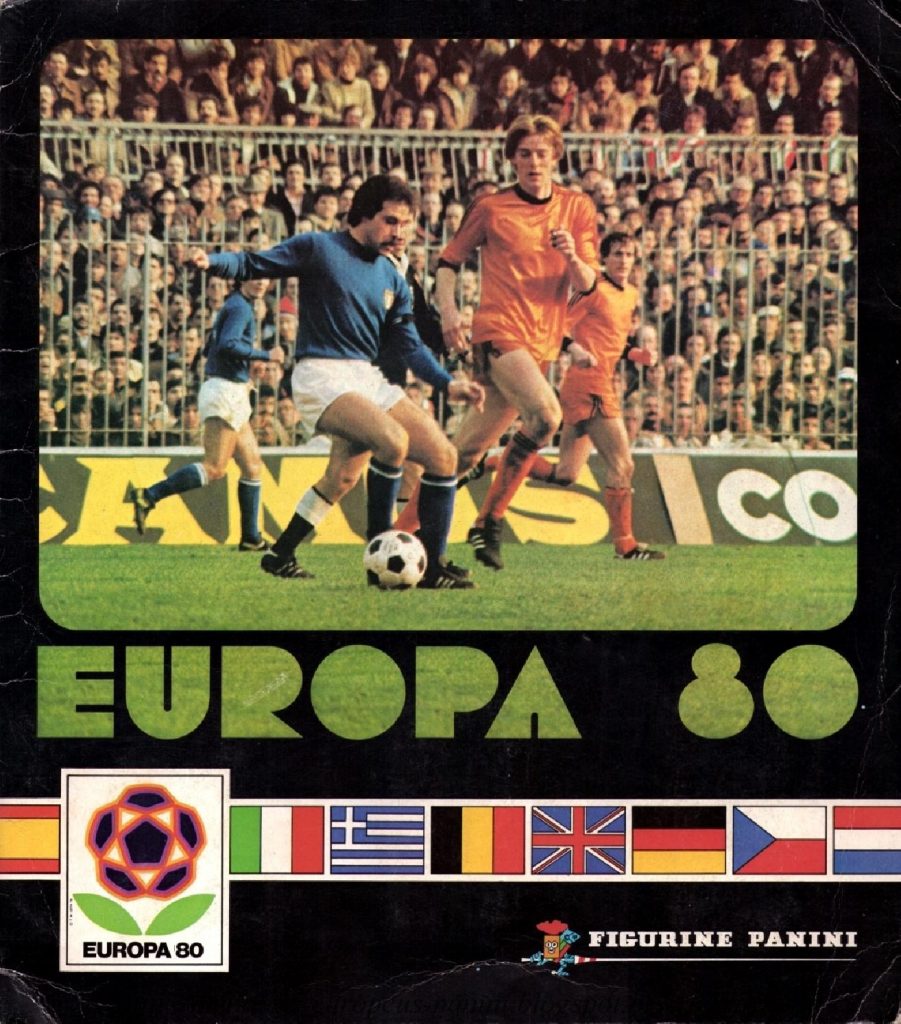
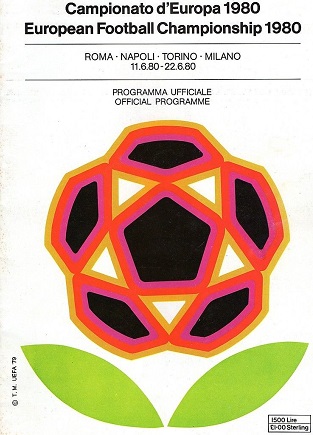
Group 1 included holders Czechoslovakia, Greece, the Netherlands and West Germany. Greece had topped a group including Hungary and the USSR to qualify for their major tournament debut, but would have to wait until 2004 to return to the Euros with a shock triumph. The Netherlands were in decline, with only a handful of players remaining from the sides beaten in the previous two World Cup Finals, notably Arie Haan, Ruud Krol and Johnny Rep. They reached the finals only by coming from two goals down to win their last qualifying game in East Germany. The Dutch squad contained Ipswich Town’s Frans Thijssen (but not team-mate Arnold Mühren) and several players soon to move to the Football League – Hans van Breukelen, Johnny Metgod, Heine Otto and Romeo Zondervan. Jupp Derwall’s West Germany squad was based on the Bundesliga, one of Europe’s strongest leagues; only two players, Rainer Bonhof and Uli Stielike, came from outside it, both with Spanish clubs.

In Group 2, England returned to international tournaments alongside Belgium, Italy and Spain after failing to qualify for the 1974 or 1978 World Cups. 1980 saw a first major tournament appearance for Kevin Keegan, top scorer in qualifying, together with 1970s national team stalwarts such as Trevor Brooking, Ray Clemence, Phil Neal and Peter Shilton. The squad also included Emlyn Hughes, who had made his England debut in 1969 and went to the Mexico World Cup a year later, while Kenny Sansom and Glenn Hoddle were the two youngest players picked by Ron Greenwood. Nottingham Forest striker Trevor Francis was ruled out by injury, while West Brom midfielder Bryan Robson was surprisingly omitted from the final 22, together with wingers Peter Barnes and Real Madrid’s in-form Laurie Cunningham.
Hopes were lifted by Forest’s European Cup win in May – in the middle of a run of six victories by English sides in Europe’s top club competition. Despite their lack of tournament experience at international level, Greenwood’s squad had 19 European Cup winners’ medals between them. England’s build-up included six successive wins, culminating in a confidence-boosting 3-1 win over reigning World Champions Argentina at Wembley in May 1980 before faltering in the Home Championship; their last warm-up fixture was a friendly in Australia.

Keegan, European Footballer of the Year with Hamburg in 1978 and 1979, was one of only two players from outside the Football League in the England squad. The other was Tony Woodcock, also in West Germany with Cologne. Keegan was “very optimistic” about the chances of “a great summer for the England team because we are getting better and better as time goes on.” Shoot! Magazine were a little more cautious in their tournament preview, concluding that “England may not win the European Championship, yet we have a feeling one way or the other that they’ll have quite a lot to smile about this summer.”


After travelling to Italy with high expectations, England disappointed with a 1-1 draw against Belgium in Turin, a match disrupted by crowd trouble with an attendance of barely 15,000. Ray Wilkins’ spectacular goal proved to be the highlight of their tournament. They were then eliminated after a 1-0 defeat to Italy in front of the Championship’s biggest crowd, 59,649. The 2-1 victory over Spain in the final group game was academic – although it was England’s last win at a European Championship finals for 16 years, until beating Scotland at Wembley as hosts in 1996.
With their return to the top level already marred by the behaviour of their fans, manager Ron Greenwood was criticised for his tactics and inconsistent team selection. He continued his policy of alternating Clemence and Shilton in goal, and ended up using 20 players in the three group games – only Hughes and the third goalkeeper Joe Corrigan didn’t feature. Greenwood reflected that “we did our best, but it just wasn’t good enough” and, despite ongoing media hostility and a difficult qualifying campaign, stayed in charge up to the 1982 World Cup finals. Hooliganism however remained English football’s biggest problem throughout the decade, with often tragic results.
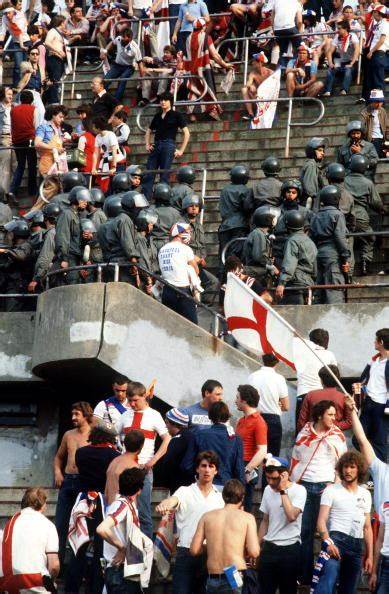
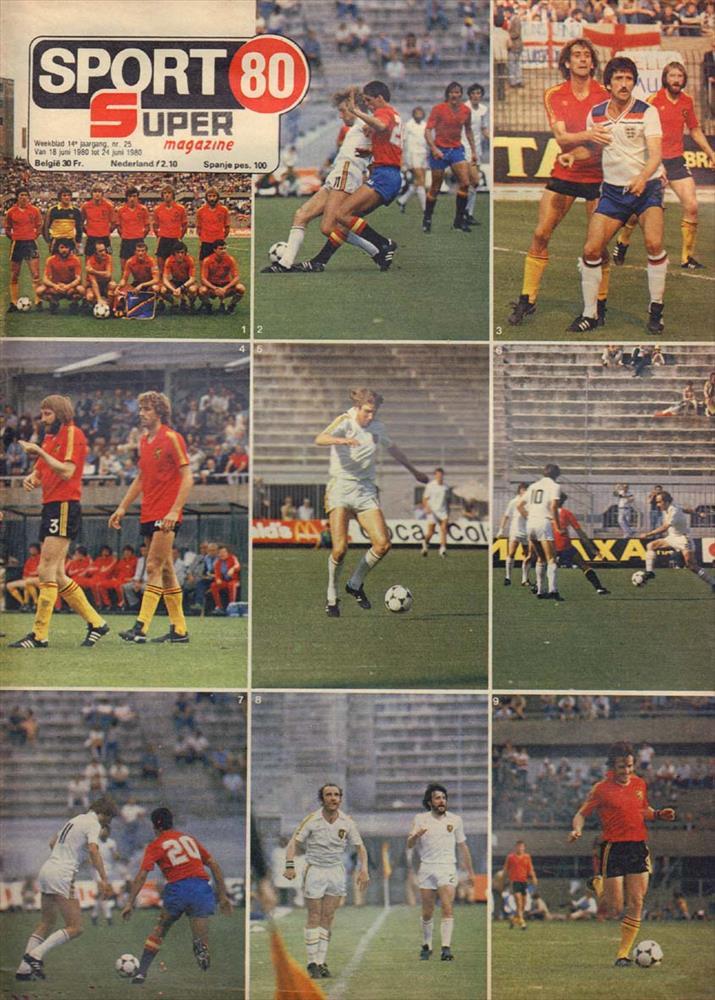
Group winners West Germany and Belgium went straight through to the final in Rome. A 47,860 crowd at the Stadio Olimpico saw the Germans lift the trophy for a second time, in their third consecutive final. Two goals from striker Horst Hrubesch won a dour game 2-1, the second a header in the closing stages. A third-place play-off took place for the last time in a European Championships, Czechoslovakia pipping Italy 9-8 on penalties after a 1-1 draw.
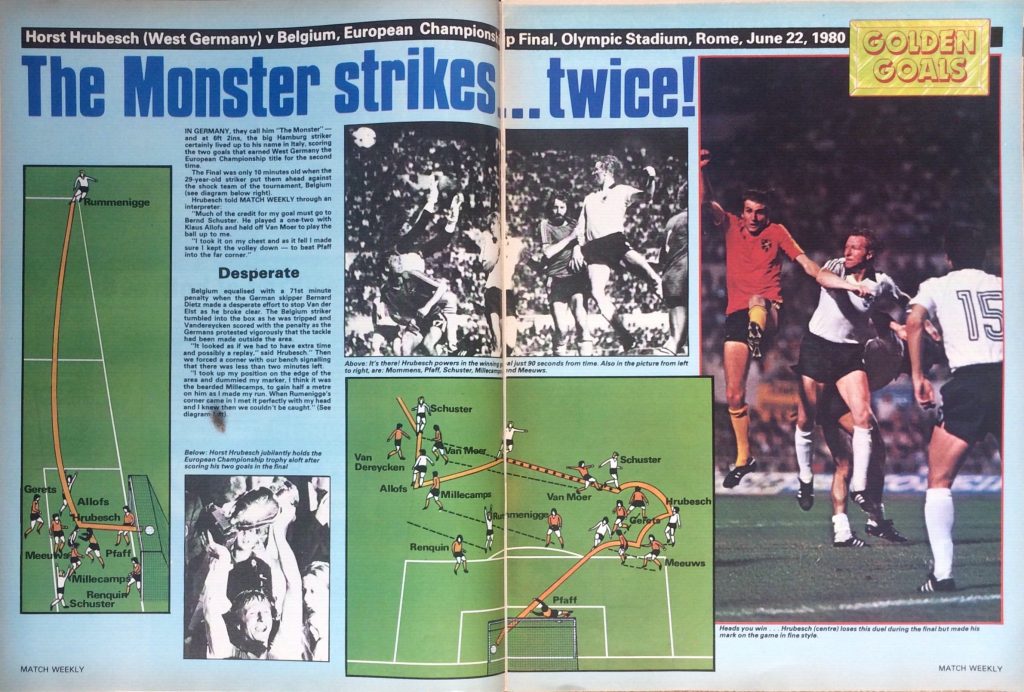
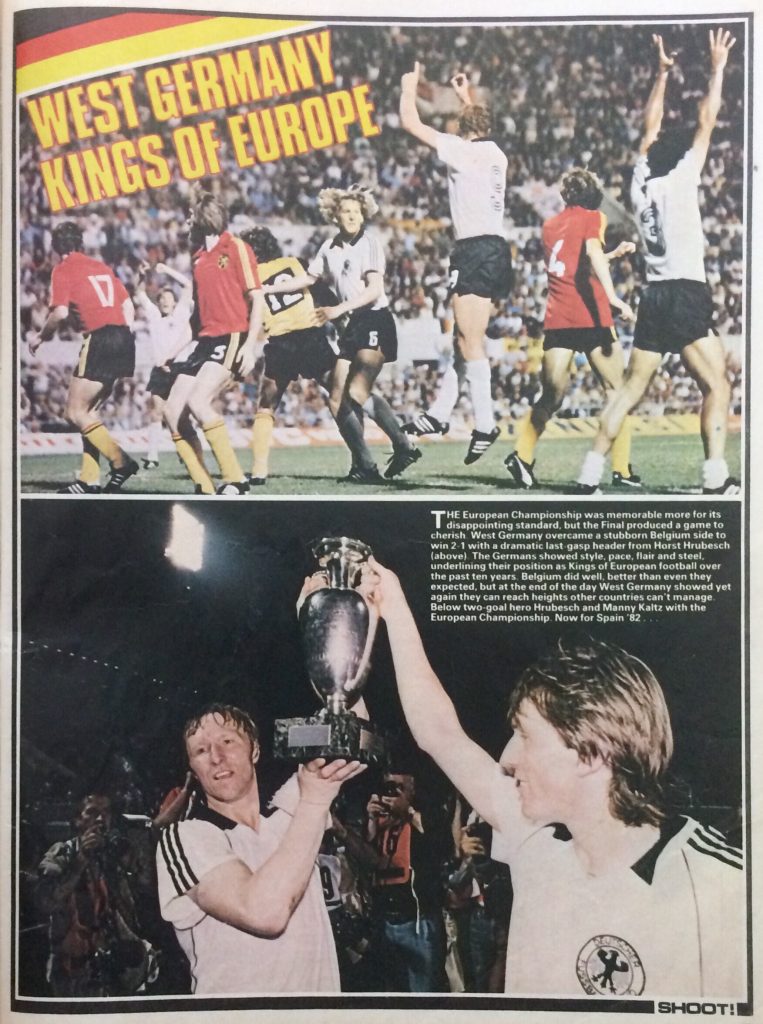
England’s lacklustre performance was typical of the finals as a whole, marked by cautious, defensive football reflected in an average of less than 2 goals per game [1.93], the lowest in the modern era. Marco Tardelli’s winner against England was the only goal in the three group games played by hosts Italy. The quality of the football was compounded by violence off the field and poor attendances including a low of 7,614 for Czechoslovakia v Greece. The next edition, held in France four years later, provided a sharp contrast. The hosts won after a tournament which produced nearly 3 goals per game [2.73], higher crowds, the brilliance of Michel Platini and some memorable matches.
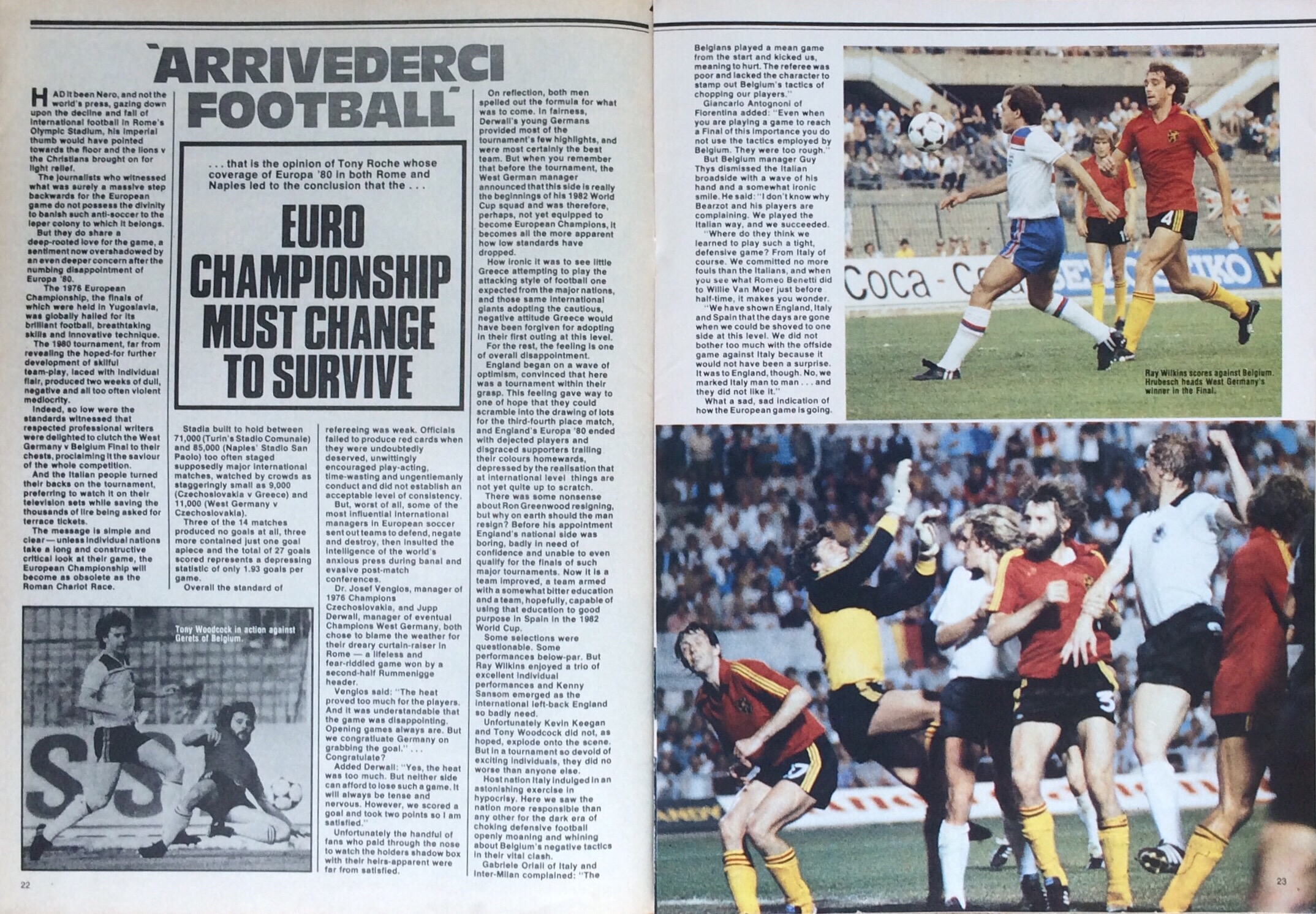



The limit of eight countries for the finals meant qualification was highly competitive. Denmark’s great team of the 1980s were yet to break through; they finished bottom of the qualifying group won by England, while Yugoslavia’s talented squad was edged out by Spain. Meanwhile many of Europe’s finest footballers also missed out. Notably Paolo Rossi, Italy’s most potent striker, was banned after the ‘Totonero’ betting scandal which had weakened Enzo Bearzot’s Italian squad. While Rossi would return with a vengeance in the 1982 World Cup, Robbie Rensenbrink became the latest of the great Dutch team of the 70s to retire from international football before the finals.
From the nations who failed to qualify, the tournament was denied the quality of France’s Platini (third in the voting for 1980’s European Footballer of the Year), Herbert Prohaska of Austria, Poland’s Zbigniew Boniek and Oleg Blokhin of the Soviet Union. The Republic of Ireland’s Liam Brady, who moved to Juventus that summer, and Liverpool’s Scottish duo Kenny Dalglish and Graeme Souness were among the other star names missing.


Several players however made their breakthrough at the 1980 tournament. Surprise finalists Belgium had the nucleus of the side that was to qualify for the next European Championships and excelled at the 1982 and 1986 World Cups with the emerging talents of Jan Ceulemans, Jean-Marie Pfaff, and Erwin Vandenbergh. West Germany had firepower in the reigning European Footballer of the Year Karl-Heinz Rummenigge, Klaus Allofs (scorer of a hat-trick against the Netherlands) and veteran Hrubesch, their match-winner in the final. In midfield, Bernd Schuster made an impression which led to his later playing for both Barcelona and Real Madrid, though his national team career faltered. West Germany’s group game against the Netherlands also saw the debut of 19-year-old Lothar Matthäus, who went on to win 150 caps and play in a record five World Cup tournaments. He incredibly played in the European Championships 20 years later, where he made his final international appearances.
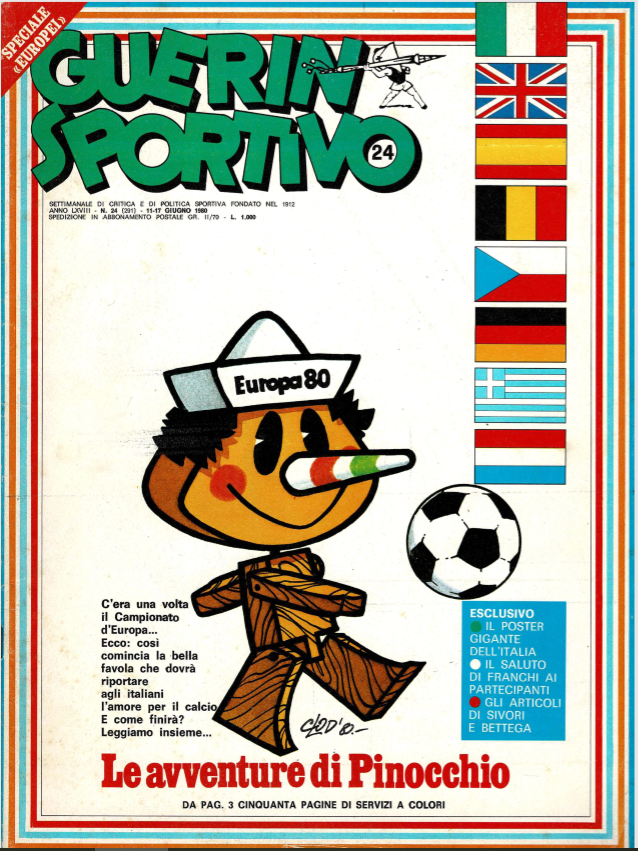
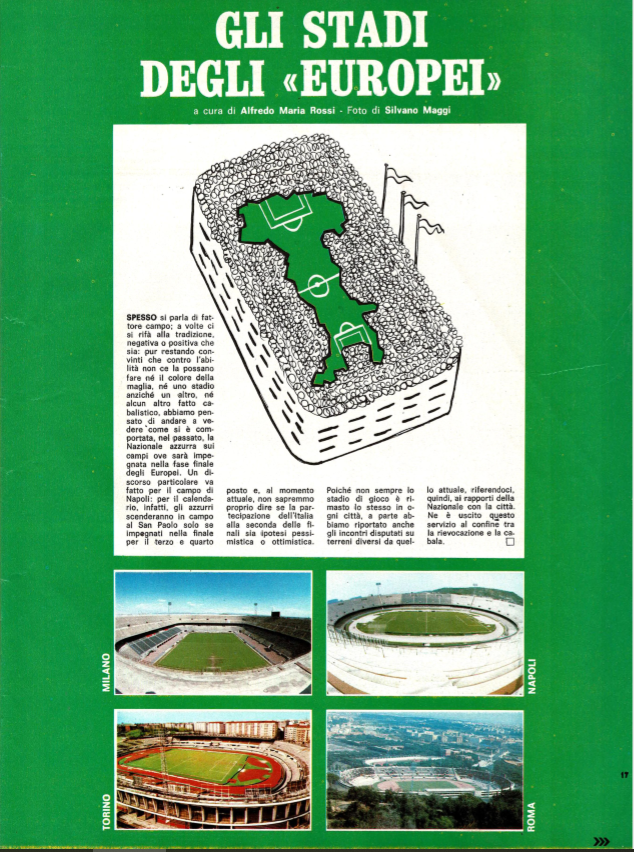

The official ‘team of the tournament’ was dominated by Italy and West Germany, with only Ceulemans representing another country: Zoff; Gentile, K. Förster, Scirea, Briegel; Ceulemans, Tardelli, Schuster, H. Müller; Rummenigge, Hrubesch. Ron Greenwood unsurprisingly included several English players in his own selection – as did Enzo Bearzot, who went for a more experimental XI.


Bernd Schuster was the rising star of the 1980 European Championship. The absence of the best German player in the further tournaments of the 1980s was a tragedy. With him, Germany would have won a title between 1980 and 1990. I am sure about this. The winning team of 1980 did not have the aura of the 1972 team with Beckenbauer and Netzer. The quality of the tournament was quite poor, the teams had a defensive strategy, preventing goals of the opponents was most important. This style was continued during the 1980s, except from the magical Brazilian team of 1982, the French team of Platini and from the 1988 teams of the Netherlands and Soviet Union, who qualified for the final.
Thank you for commenting Uwe. This wasn’t a great tournament for England but it’s interesting to hear from fans in other countries – especially as West Germany were the winners. The European Championships of 1984 and 1988 were much more memorable!